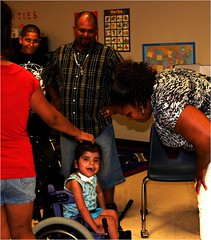 Image via WikipediaThere is no need to lie to an audience and pretend that the author of this blog is no reformer. There's no getting away from what I am. If there were a sign to carry about special education in Indiana, I'd be there holding it and singing We Shall Overcome till the cows come home. It's discouraging that this is so often a bad thing in social circles.
Image via WikipediaThere is no need to lie to an audience and pretend that the author of this blog is no reformer. There's no getting away from what I am. If there were a sign to carry about special education in Indiana, I'd be there holding it and singing We Shall Overcome till the cows come home. It's discouraging that this is so often a bad thing in social circles.Reformers seldom win popularity contests. They make waves, and therefore they make enemies. If you don't believe it, ask a suffragette or civil rights protester of the sixties. To bring it into modern terms, ask a Libyan or Egyptian on the streets. These are extremes, but no less difficult is the life of the mom fighting for free and equal public education for a disabled child in today's world. Instead, moms and dads of the disabled have to be in it for the long haul. A revolution has a foreseeable end, not so with disability and education coming together.
The battle to provide services for children will be fought again and again, until our society prioritizes its most vulnerable. Before I had a child with autism, I would have assumed (did assume) that we had jumped that hurdle with disability. Now, I know better.
There is an unwillingness to "waste" money on educating kids who "can't succeed". So many in our culture never think that the problem isn't with the kid, or even the disability, but with our definition of success.
I wish I could say to parents it will get better, but I don't know that. What I do know is that to change society it will take outspoken, passionate advocates, and it will take time. Parents are the pioneers to reform because they have the most to lose. We have to embrace who and what we are. Damn the torpedoes and full speed ahead!










